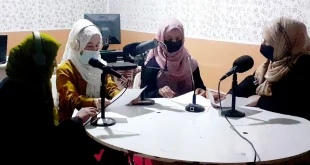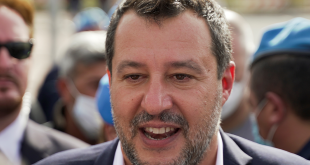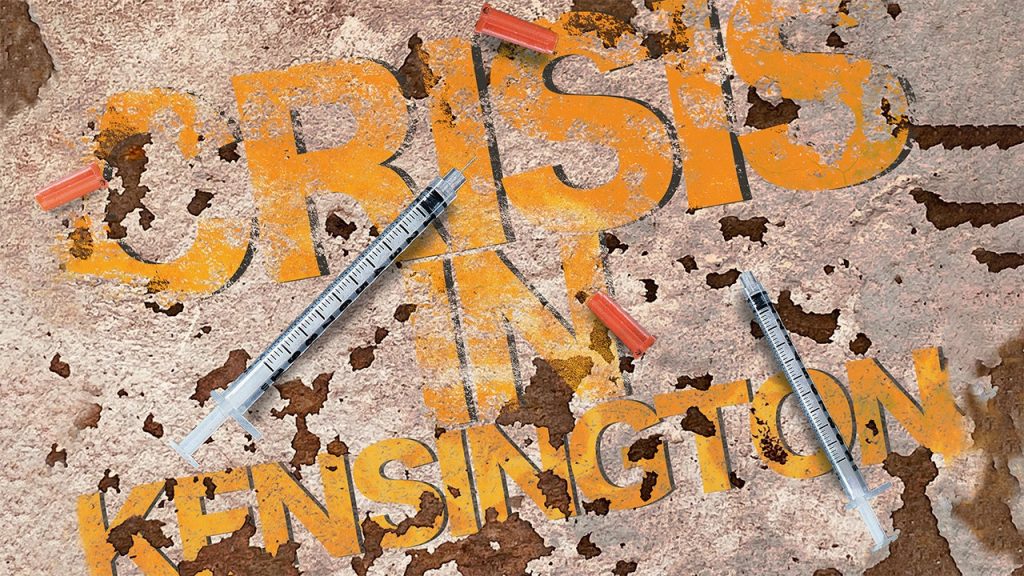
A company owned by the Sackler family — widely blamed as one of the major initial drivers of the opioid epidemic — is continuing to rake in sales from overdoses abroad, though a representative said the firm doesn’t profit off those sales.
The Sackler family, most known for its ownership over OxyContin maker Purdue Pharma, also owns the international pharmaceutical company Mundipharma. The firm pushes overseas its overdose antidote, a naloxone nasal spray called Nyxoid.
“You’re in the business of selling medicine that causes addiction and overdoses, and now you’re in the business of selling medicine that treats addiction and overdoses?” Dr. Andrew Kolodny, an outspoken Purdue critic, told the Associated Press in 2019. “That’s pretty clever, isn’t it?”
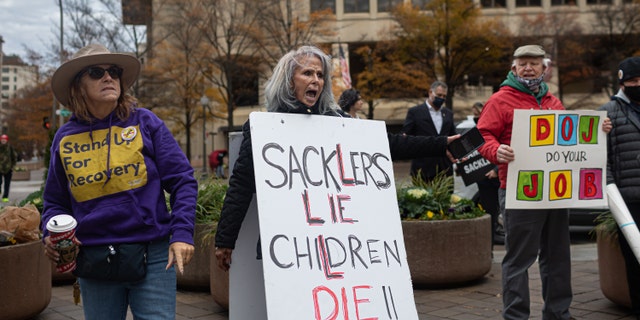
People from across the United States who lost loved ones due to the opioid epidemic rallied at the Department of Justice in Washington D.C. and blamed the Sackler family and their company, Purdue Pharma, for overdose deaths. (Michael Nigro/Pacific Press/LightRocket via Getty Images)
CRISIS IN KENSINGTON: OPIOIDS HIT PHILADELPHIA LIKE AN ATOMIC BOMB. THIS MAN IS DOCUMENTING THE FALLOUT
A Mundipharma spokesperson emphasized that the company isn’t active in the U.S. market.
“Mundipharma distributes Nyxoid to several countries, outside the US,” the spokesperson told Fox News. “It makes no profit from such sales.”
The spokesperson also told Fox News it “is publicly known that our shareholders intend to sell Mundipharma within seven years” of a Purdue bankruptcy plan becoming effective. “We have no further information or details to share at this time about any such sale.”
In 2019, meanwhile, a Mundipharma Europe spokesman told the AP that overdose reversal drugs administered as a nasal spray is important, given the dismal rate of overdose deaths.
“If they were trying to find a solution, they would just distribute naloxone for free,” Stephen Wood, a fellow at the Harvard Medical School Center for Bioethics, told the AP. “They could use all that money they made off opioids to help support a program where they are giving away this life-saving medication.”
Profits from OxyContin helped make the Sacklers one of the richest families in the world. But in recent years, Purdue and its private owners have faced lawsuits accusing them of pursuing an aggressive and deceptive marketing campaign pushing OxyContin prescriptions all while downplaying the drug’s addictiveness.
RECOVERING ADDICT EXPLAINS WHY HEROIN USERS FEAR NARCAN. WATCH:
WATCH MORE FOX NEWS DIGITAL ORIGINALS HERE
A common story emerged: An OxyContin user would form an addiction, then turn to heroin once the prescription drug became too expensive or hard to obtain illicitly.
In some cases, they were legitimate patients who followed the prescription’s guidelines while others started taking OxyContin more frequently when they felt its effects diminishing. Some took the drug illegally while experimenting in their youth, often from a family member’s medicine cabinet, without understanding its addictive nature.
Lawsuits against Purdue and the Sacklers allege that internal documents indicate that the company aimed to profit off addiction. According to the plaintiffs, one stated that Purdue could become an “end-to-end provider” by providing both opioids and addiction treatment, the AP reported.
WOMAN WHO LOST HER SOULMATE TO FENTANYL DISCUSSES GRIEF AROUND HOLIDAYS, HONORING LOST LOVED ONES
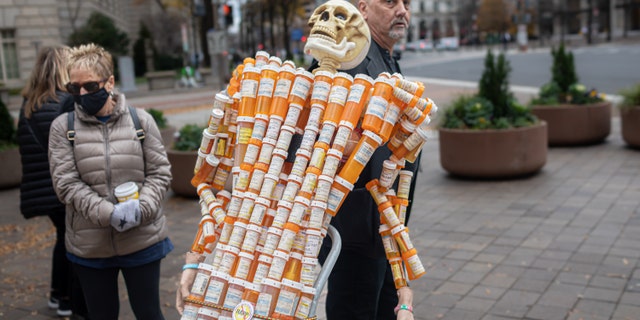
An advocate has been trying to raise awareness of opioid addiction with his sculpture “Pill Man.” (Michael Nigro/Pacific Press/LightRocket via Getty Images)
Representatives for the Sackler family at the time said a third-party presented the plan and was abandoned after a few passing mentions. The Mundipharma spokesman rejected any connection between the international Nyxoid push and any Purdue plans for naloxone.
Opioid overdoses have been on the rise since the ‘90s, but there was a significant spike as the COVID-19 pandemic took hold. In 2021, there were over 80,000 overdose deaths — about a 60% increase from 2019, according to the National Institutes of Health.
An overdose reversal drug became necessary as a result of the opioid epidemic, particularly one that’s easy to use like Nyxoid abroad. In the U.S., naloxone has become synonymous with a similar nasal-spray product, Narcan.
CRISIS IN KENSINGTON: WHERE ADDICTS FEAR THE VERY THING THAT CAN SAVE THEIR LIVES
In Philadelphia, home to one of America’s most notorious open-air drug markets, the fire department and emergency medical services have administered naloxone nearly 19,600 times between 2014 and 2019, the most recent full year with data available, according to city data.
But the drug isn’t a catch-all solution.
“Once they get Narcan in their system, it puts them in immediate withdrawal,” Frank Rodriguez, a recovering addict, told Fox News. “They have to get high again to not feel like they’re dying.”
He said he always makes sure to have naloxone available whenever he drives into the city.
“This saved my life,” he said, holding up Narcan.
CRISIS IN KENSINGTON: DRUG OVERDOSES KILL 12 PENNSYLVANIANS A DAY. WATCH ONE MAN’S FIGHT TO HELP ADDICTS
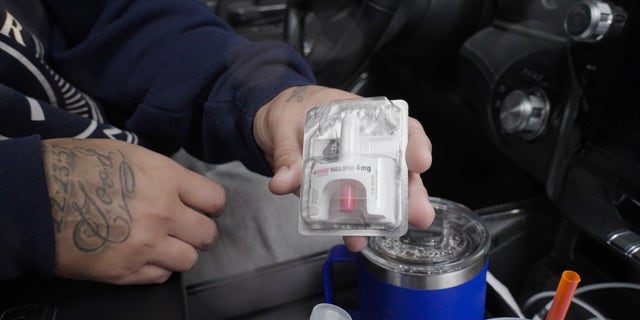
Frank Rodriguez holds out a dose of Narcan. The addict-turned-activist keeps the drug in his glove compartment and has it prepared whenever he enters Philadelphia (Fox News)
Regardless of the necessity of an easy-to-use overdose reversal drug, Mundipharma has faced criticism for pushing from Nyxoid after the company’s owners profited off opioids.
CLICK HERE TO GET THE FOX NEWS APP
The Sackler family’s efforts to sell Mundipharma’s China unit for $1 billion fell through in January 2022, Bloomberg reported at the time. There’s been no other public reporting indicating that Mundipharma or any of its units have been sold.
Purdue Pharma and the Sackler family have been embroiled in a litany of court cases in recent years. The pharmaceutical company pleaded guilty to misbranding and fraud charges in 2007 and again in 2020.
Purdue filed for bankruptcy in 2019, but legal proceedings are ongoing. The company offered a $6 billion settlement, funded by the Sacklers, that would get paid out to various victims of addictions, including states and hospitals. In exchange for that settlement, which is still under consideration, the family would be protected from future opioid lawsuits.

 Latest Breaking News Online News Portal
Latest Breaking News Online News Portal


